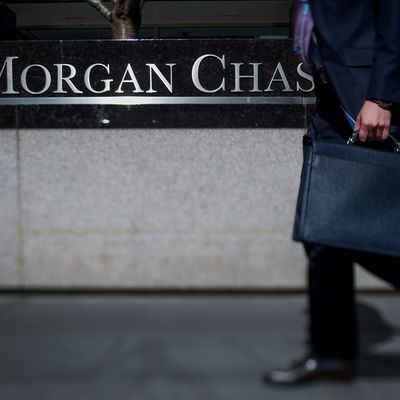
Last year, amid a historic drug-overdose epidemic, a rapidly accelerating ecological emergency, a deepening crisis of housing affordability, a collapse in social mobility, a drop in fertility rates fueled by the exorbitant price of child care, steadily rising health-care costs, and stagnant middle-class wages, America’s elected leadership decided that the No. 1 policy problem in the United States was that our country’s (already historically profitable) corporate sector was paying too much in taxes.
The Republican Party justified its decision to invest the bulk of its legislative energies — and $1.5 trillion worth of deficit spending — into corporate tax cuts with a simple prediction: Lowering America’s 35 percent top corporate tax rate (which virtually no companies were actually paying) down to 21 percent would trigger a frenzy of business investment, which would increase the productivity of the nation’s firms — and thus, the wages of its workers. The resulting economic boom, replete with high levels of innovation and growing paychecks for the long-suffering middle class, would reduce the deficit, while making all America’s other problems easier to solve.
Democrats, by contrast, insisted that the tax cuts would do little beyond enabling corporations to artificially jack up their share prices by plowing ungodly sums of money into stock buybacks.
It now looks like both sides were wrong.
In the first six months after the Trump tax cuts were passed, corporate investment in equipment declined, America’s projected long-term deficit swelled by nearly $2 trillion, and wages for the vast majority of American workers fell on an inflation-adjusted basis.
And there is no sign that reality will start comporting with the GOP’s predictions any time soon. As the Washington Post’s Heather Long notes, Morgan Stanley reported last month that America’s businesses are planning less future capital spending now than they were a few months ago. And that finding is bolstered by a recent survey of 393 businesses from the U.S. Chamber of Commerce and the audit firm RSM, which found that only 38 percent of those firms plan to increase investment over the next three years.
Instead of channeling their profits into productive investment, S&P 500 companies are on pace to plow a record-setting $800 billion into buying back their own stocks. The point of such “stock buybacks” is to increase a firm’s share price (and thus, in many cases, the performance-based pay of its CEO) by reducing the supply of shares on the market.
And yet, Democrats were still wrong to claim that the Trump tax cuts would do little beyond enabling corporations to profit off inflating their stock prices — because the tax cuts aren’t even accomplishing that. As The Wall Street Journal reports, corporate America is engaging in a stock buyback bonanza that isn’t even buying it short-term financial gains:
S&P 500 companies are on track to repurchase as much as $800 billion in stock this year, a record that would eclipse 2007’s buyback bonanza. Among the biggest buyers are companies like Oracle Corp., Bank of America Corp. and JPMorgan Chase JPM 0.33% & Co.
But 57% of the more than 350 companies in the S&P 500 that bought back shares so far this year are trailing the index’s 3.2% increase…And the historic spending spree on share buybacks has some analysts worried companies are buying their shares at excessive valuations during the peak of the economic cycle and at a time when the market rally is nine years old…The S&P 500 Buyback index, which tracks the share performance of the 100 biggest stock repurchasers, has gained just 1.3% this year, well underperforming the S&P 500.
Good thing we didn’t invest that $1.5 trillion of deficit spending on providing universal day care, ending all homelessness in the United States, lifting millions of American children out of poverty, and/or making medication-assisted opioid-addiction treatment easily accessible and affordable for all who need it.
Clearly, the private sector has allocated that capital much more efficiently.






























